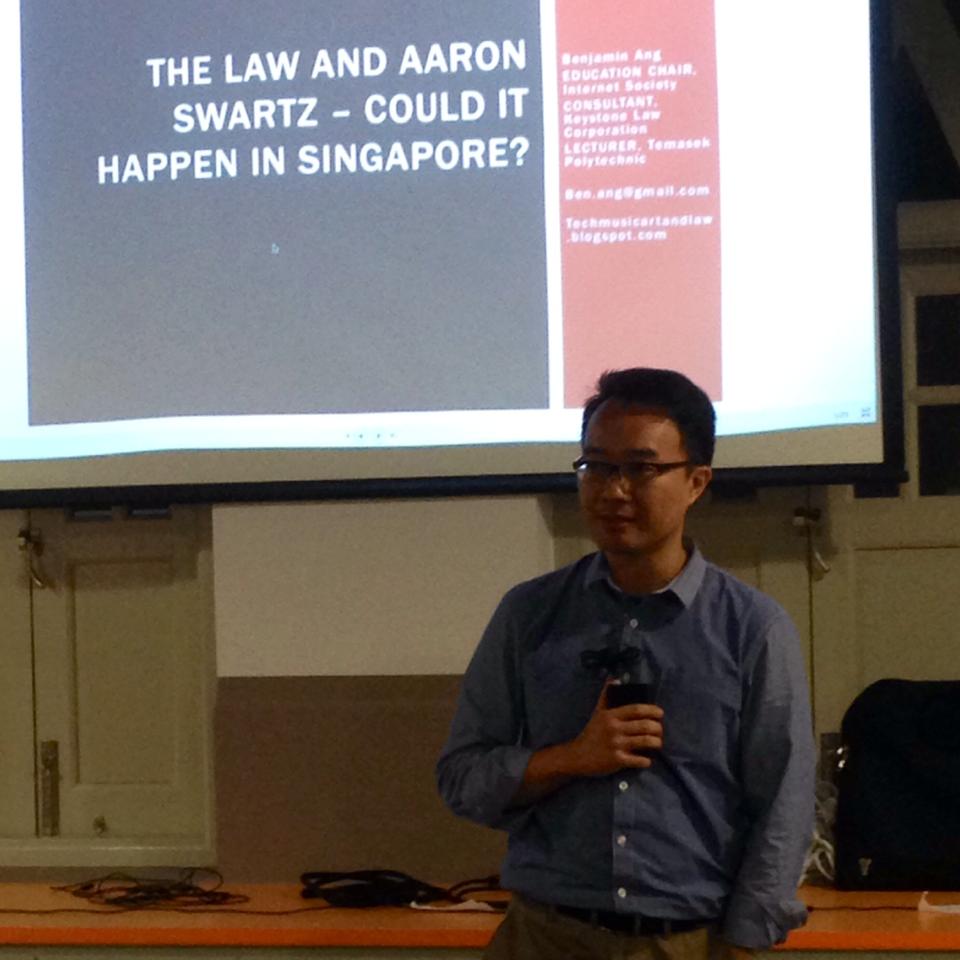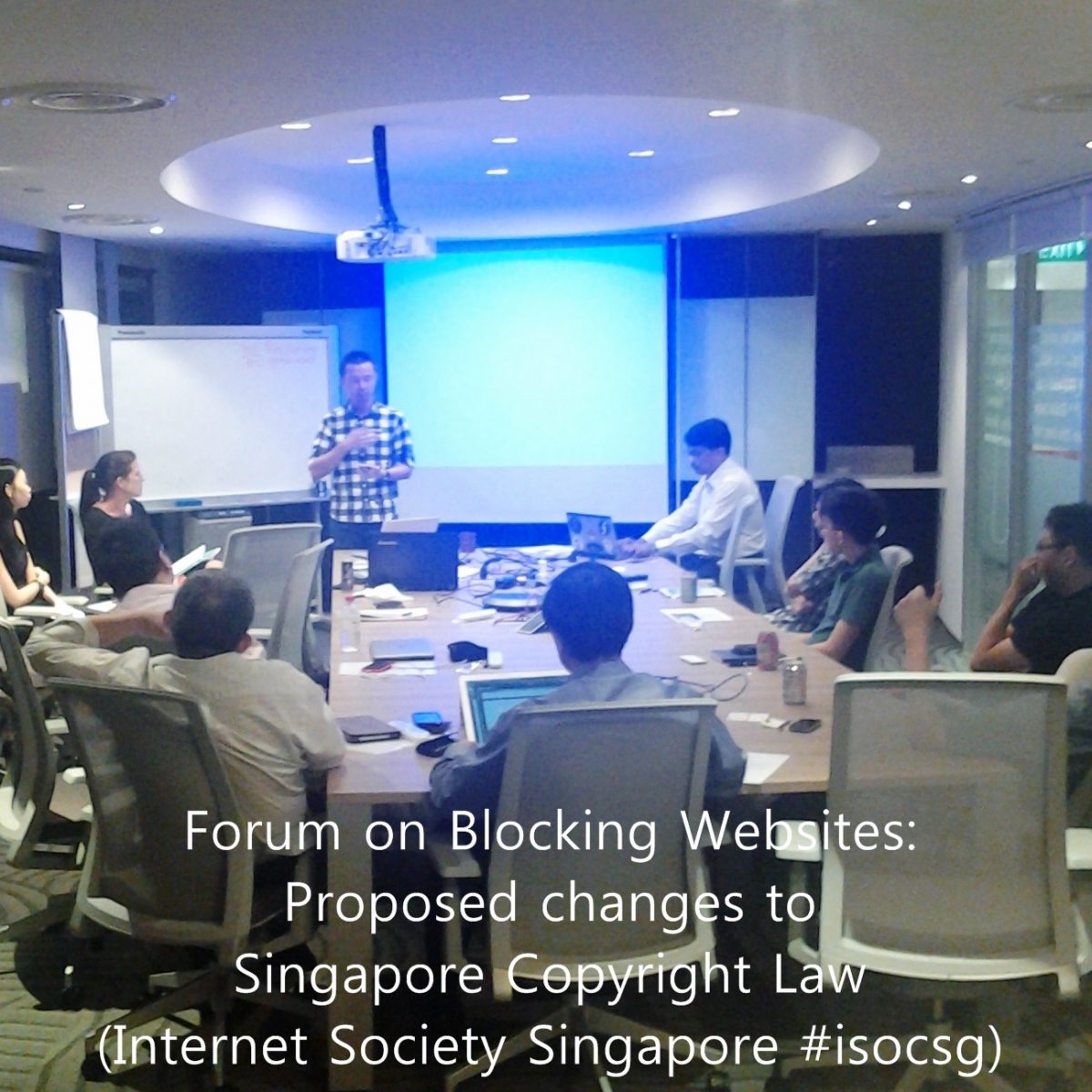Event Report:
How MDA’s new Licensing Regime will affect YOU
Date: July 4, 2013
Venue: Singapore Computer Society Resource Centre, 53 Neil Road, Singapore 088829 (ground floor meeting room)
Click here for Benjamin Ang’s (Lecturer BUS/LAW) live blog report from the event.
Today Online‘s report from the forum: “MDA working with licensed news sites to make new rules ‘clearer’”
The Straits Times on Mr Aubeck Kam’s remarks: “No major changes likely for online licensing rules“
The Online Citizen‘s report and comments.

Speakers:
• Mr Aubeck Kam, Permanent Secretary for the Ministry of Communications and Information
• Mr Bryan Tan, Partner at Pinsent Masons
• Mr Kuek Yu-Chuang, Internet policy expert
“Let me start by putting this in some historical context,” said Harish Pillay of the Singapore Computer Society in his opening remarks. As one of the editors of the pioneering Singaporean site Sintercom (sintercom.org), he spoke about the 1996 Internet Regulations Workshop that first bought up issues of class licensing, content filtering and registration of sites.
Established in 1994, Sintercom was one site that “died along the way” because of new regulations. A note was sent to the editors in 2001 requiring them to register the site. “I felt that the registration process was a bit onerous,” Pillay said. “Requiring details like my salary and so on…it didn’t make sense to me.” The site shut down soon after.
The first speaker, lawyer Bryan Tan, pointed out that the new regulations werebest understood as an extension of existing class licenses, the Internet Code of Practice (1996) and the Electronic Transactions Act (2010). The additions to the 2013 rules from the MDA, requiring news websites that meet a certain criteria of coverage and readership to apply for a license, included:
1. A requirement to comply with MDA requests for takedown within 24 hours, and
2. A performance bond of 50,000$ (consistent with niche TV broadcasters).
The keyword here was consistency, bringing online news sites in line with traditional media outlets.
Mr Tan then raised a number of issues in need of further discussion: Is it beneficial, he asked, to have open ended drafting, as it allows regulators to deal with new situations and threats quickly? “A lot of the messaging about the new rules from the MDA seemed to be that it’s a big change,” he said. “But it hit the headlines and resurfaced constantly.”
He pointed out that the clarification to the MDA rules was posted on Facebook –what weight does a Facebook note carry legally? Is it equivalent to a statute, a rule, or even a debate in parliament?
The next speaker, Mr Kuek Yu-Chuang, took on the question of whether similar systems existed elsewhere in the world. “This issue is not uniquely Singaporean,” he said.
Pointing to Australia, he noted a recent issue of objectionable humour against the Aboriginal community – “It was offensive, and unacceptable…and at the same time, there was difficulty in taking down the content,” He said.
The internet’s lack of boundaries meant a strong need for what Mr Kuek called “calibration” in terms how Singapore responds vis-a-vis other jurisdictions grappling with the same issue. “Otherwise, we run the risk of Balkanizing or fragmenting the Internet,” he said.
He added that people respond differently to different media, so the idea of parity between print, online and broadcast has to investigate these differences. He concluded by asking: “If we think that a lot of content out there is inaccurate, and carries the risk of social disorder – one of the policy questions needs to be: ‘if this is the reality of the Internet – how can we get Singaporeans ready, mature and savvy to handle this?’”
Aubeck Kam, the Permanent Secretary of the MCI, was the last speaker. The new MDA rules were necessary, he said, as readers make important decisions based on information they receive. Online sites, as news providers, carried the same special responsibility that traditional news outlets have.
He outlined some of the challenges with self-regulation of the media (such as the News of the World scandal in the UK), and argued that the view that all regulation was unnecessary was “simplistic.”
“We are not the first country to regulate the media, and we will not be last,” he said.
Mr Kam pointed out that the trend of media convergence required a more consistent regulation framework, as different mediums and forms overlapped constantly.
He clarified that MDA has not banned any news sites, and has never ordered removal of content that is critical of the government. “What has changed is that the 10 sites under the licensing rules have moved from a class license to an individual license,” he said, and paid a performance bond. The bond, he added, does not need to be paid in full, and a banker’s guarantee is often enough.
In a vociferous question-and-answer session, Kam noted that one of the areas being “relooked” at was the liability of the licensed news websites for third-party content, a point raised in a letter to the MDA from the Asia Internet Coalition (AIC).













